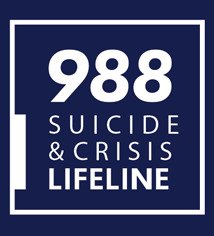Suicide Prevention
 People become suicidal when they believe that they cannot tolerate overwhelming feelings. They feel as if there is no way out and that they will always feel the way they feel at that moment. These feelings can arise as the result of loss (the death of a loved one, the end of a relationship, a financial crisis), overwhelming depression, other mental health problems, a serious illness or any situation that seems hopeless to the person involved. Unfortunately, the intensity of such feelings often leads to an inability to consider alternatives to suicide. Please remember, alternatives do exist and there are many people available to help you through this crisis.
People become suicidal when they believe that they cannot tolerate overwhelming feelings. They feel as if there is no way out and that they will always feel the way they feel at that moment. These feelings can arise as the result of loss (the death of a loved one, the end of a relationship, a financial crisis), overwhelming depression, other mental health problems, a serious illness or any situation that seems hopeless to the person involved. Unfortunately, the intensity of such feelings often leads to an inability to consider alternatives to suicide. Please remember, alternatives do exist and there are many people available to help you through this crisis.
Counseling and Psychological Services is the primary campus resource available to assist students who are feeling suicidal. CAPS is open from 8:30 AM until 4:30 PM and can be reached at 860-465-0181. You can also request help in-person at our office, which is located at 182 High Street.
Another option if you are feeling suicidal and would like to speak to someone now, or if you have other questions about suicide risk and the help that is available, you can call The Suicide & Crisis Lifeline at 988 or you can contact the Crisis Text Line by texting HOME to 741741. You can also contact the LGBTQ+ Suicide Prevention Hotline (The Trevor Project) 24/7: 1-866-488-7386.
If you are experiencing active suicidal thoughts, plan and intent please call 911 or proceed to the nearest emergency department for support.


 People become suicidal when they believe that they cannot tolerate overwhelming feelings. They feel as if there is no way out and that they will always feel the way they feel at that moment. These feelings can arise as the result of loss (the death of a loved one, the end of a relationship, a financial crisis), overwhelming depression, other mental health problems, a serious illness or any situation that seems hopeless to the person involved. Unfortunately, the intensity of such feelings often leads to an inability to consider alternatives to suicide. Please remember, alternatives do exist and there are many people available to help you through this crisis.
People become suicidal when they believe that they cannot tolerate overwhelming feelings. They feel as if there is no way out and that they will always feel the way they feel at that moment. These feelings can arise as the result of loss (the death of a loved one, the end of a relationship, a financial crisis), overwhelming depression, other mental health problems, a serious illness or any situation that seems hopeless to the person involved. Unfortunately, the intensity of such feelings often leads to an inability to consider alternatives to suicide. Please remember, alternatives do exist and there are many people available to help you through this crisis.